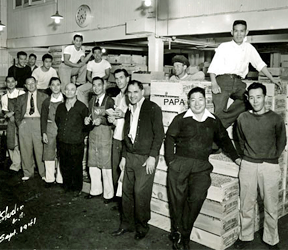
Kiro “Papa” Nagano
Camp Name:
Manzanar
Block Number:
6
Barracks Number:
11
Location during WWII, if not in a camp:
Missoula, Montana
Kiro “Papa”
Nagano
My maternal grandfather, Kiro Nagano, was born in Sapporo on Hokkaido in June, 1896. He was the second son of Tokuma and Tokue Nagano. His father owned a successful wholesale paper company in Sapporo. As is the fate of second sons, Kiro was free to seek his own fortune while his older brother was groomed to take over the family business.
Kiro arrived in Seattle to attend the University of Washington, but abandoned that plan and continued travelling south to California where he ended up working on a farm in Stockton. He made his way to Los Angeles where, after a year, he ended up leasing and farming 25 acres around Adams and Crenshaw.
In 1920 he returned to Japan to marry his best friend’s sister, Ai Enoki. After settling her in Los Angeles, he established Nagano Produce. Kiro and Ai had three children—Daisuke (1921), Momo (my mother—1925), and Aiji (1926). In the ’20s, Papa (as we and many other friends called him) shared his time among his family, his business and the martial arts community. He was a sumo wrestler as well as a judoka. My grandmother said that because of racism in the wholesale produce market, Papa would be called upon to defend injustices and sometimes had a fight a day.
In September 1941, Papa had just expanded his successful produce business. He was also an active member of the southern California Judo Association. So on December 7, 1941, he was on a list of people who were picked up that very night. Over the course of the next two years he moved through seven jails and prisons until he was reunited with his family in Manzanar. The reason given for all the moving around was so this dangerous, enemy alien would not learn the lay of the land.
When he was reunited with his family, he told many stories of his travels, but was careful to only tell the funny ones. It was only through reading historical accounts of the various sites that my mother realized that he had shielded his family from the dark side of his experience. Papa was a methodical and organized man and kept all his correspondence from the war, complete with his family’s censored letters.
When EO 9066 was being enacted, Papa was in Missoula, MT. One favorite family story was about his routine of taking a cold shower every morning “to build character and self-discipline.” He continued this practice in Montana even when it was 30 below. The soldiers (and no doubt fellow prisoners) would gather to watch him, incredulous.
The second to the last stop for Papa was Santa Fe. The same week his family received the news of his transfer and appointment as camp fire chief, there was an article in the Manzanar Free Press reporting the mess hall in Santa Fe had burned down.
Santa Fe was where my mother traveled for his “parole” hearing after requesting that her father be returned to live with her mother so Momo might be allowed to go to attend college back East. Papa and his family were released from Manzanar in November 1943. Eventually he returned to California and the produce business where he partnered with a white friend to establish Imperial Farms, a produce stand out near Hollywood Park. Papa was the wholesale produce buyer—a job he held until his first heart attack in 1952. After his recovery he retired to a life of playing the stock market, golf, and following baseball.
Papa also continued to be an ambassador and promoter of judo. Papa was among the judo men who introduced judo at the 1932 Olympics. He eventually was promoted to hachi-dan (eighth rank) but he said that it was only honorary because of his age and downplayed his rank. In 1968 he was inducted into the newly established Black Belt Hall of Fame.
Papa died in 1974 when I was a senior in college. He was never a chatty grandfather, but if there were other people in the room, someone inevitably would tell a story about him, so he never had to talk about himself. The only heart-to-heart talk with me was when I was 17 and he had just found out that my parents had been divorced (for 7 years by that time!) He told me that as the oldest I should help take care of the family, and to be a good student (both of which I did and was.) I know it felt awkward for him to tell me this, but he did it anyway.
One day, months after JANM opened to the public, my mother and I went down to check it out. There was a screen playing old home movies of JA families. We sat down to watch. A kenjinkai picnic with a judo tournament appeared, and my mother started to reminisce about those picnics. Suddenly the camera panned the crowd and Papa’s distinctive broad face appeared smiling. We were dumbstruck and both choked up to see him alive on screen for a fleeting moment. Knowing that a little of Papa was now part of the greater official history of the Japanese American experience gave me a sense of pride. This tribute is my way of honoring and expanding his presence in that history.